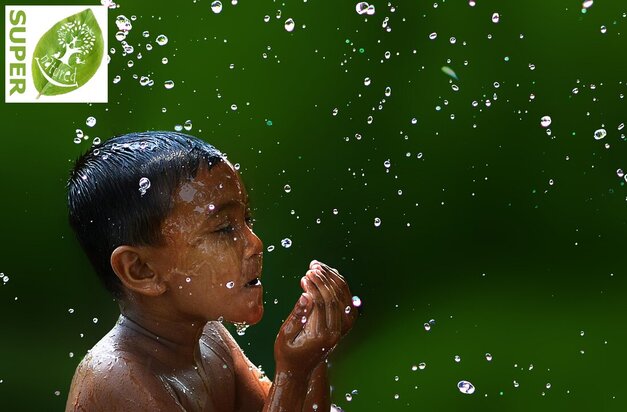 Although we may accept a bit of rain, “suppose the garden needs it”, but did you know that our bodies also need the rain for its negative ion benefits? Remember catching rain on your tongue and that connection with the elements as a child. Maybe you instinctively connected with nature more because if felt so good, without knowing what it was doing for you on a deeper level, before life’s conditioning made you kick good habits like this as you got older? Negative ions are the only example I can recall in which a negative is a positive. Yes, that’s correct. Negative ions are a very good thing; they produce a net positive effect on our health. Negative ions are tasteless, odourless and invisible molecules that we inhale when we are in environments that contain moving water, like rain. Once the negative ions reach our bloodstream, they are believed to produce biochemical reactions that help to relieve stress, alleviate depression and even boost our energy. Not only rain enables an abundance of negative ions to be released but also waterfalls, the ocean and even dew and mist in the mountains. Have you ever noticed how you experience a sense of euphoria by being around these beautiful settings and away from the everyday pressures of work, school or home? The action of the pounding surf creates negative air ions and we also see it immediately after spring thunderstorms when people report improved mood. That’s because the air circulating around moving water contain tens of thousands of negative ions — unlike a closed home or office, with all its electronics produce 'positive' ions. Imagine if scientists (most funded by business) and the media had named these ions the opposite way around? Who would surround themselves with lots of technology, stay in their houses and offices around these ions so much - if you knew they were damaging your body, without a healthy break outside? 'Positive' ions from computers, wifi, telecommunications are not good for our health, some even attack our cells at molecular level (e.g. microwaves, basically radiation - the stuff they use to kill cells in your body to get rid of areas of cancer). Your body can recover exposure from ‘positive ions’ at low level, healing itself, with breaks from it, if you look after yourself with exercise, healthy diet and.... surprise, surprise, regular contact with nature makes a positive difference in so many ways. Few doctors 'prescribe' getting outdoors into nature as a simple preventive treatment. There is little funded research into the benefits of contact with nature, compared to the investment in pharmaceuticals. The media are rarely cover and promote good evidence that's out there, when they do, often they are dismissive and make a bit of joke about it (e.g. after doing a piece on 'Blue Gym' research, the reporter scoffed at the end of a national breakfast news interview, "now I'm off for a bit of extra Black Gym", after travelling over night to cover this public health research in Cornwall early on summer morning. It's not hard to understand why..... it's FREE! What contributions could a GP surgery get for referring their patents? They may even be asked to pay someone to put on activities to help build confidence and interest amoungst people for whom, getting into nature more often might need some encouragement, mentoring and confidence building. Sad, but ncreasingly true. Who would the media go to for adverts, or other funding to pay for their time running stories? Nature is accessible to everyone and may even increase our natural ability to fend of disease, age better, stay fitter, longer, without the need for a pill or a vaccine. Walking in the rain might sound crazy, but these healthy reasons to take a stroll during a rain shower will change the way you view a walk on a drizzly day. A host of health benefits that soothe the mind, body and soul. 8 More Healthy Reasons To Take A Walk In The Rain
A study by Columbia University used negative ion generators to see their effect on people with winter and chronic depression. The study showed that these generators helped relieve depression as much as antidepressants. The best part is that there are relatively no side effects, but scientists are still trying to figure out appropriate doses and which people it works best on. Elsewhere experiments have been conducted with negative and positive ions using a cross-section of men and women between the ages of 20 and 65. When they were put in a room that contained primarily positive ions, they became irritable and fatigued. However, when they were confined to a room containing primarily negative ions, their brainwaves suggested increased alertness and relaxation. Their alertness and work capacity were tested by various means. What is significant is that they all scored higher during and immediately after their exposure to increased levels of negative ions. So the next time you think you don’t want to get wet when it rains, I say forget the umbrella, open your arms to the sky and say, “Hello, negative ions, do your magic!” |
help more people get nature
|


 RSS Feed
RSS Feed